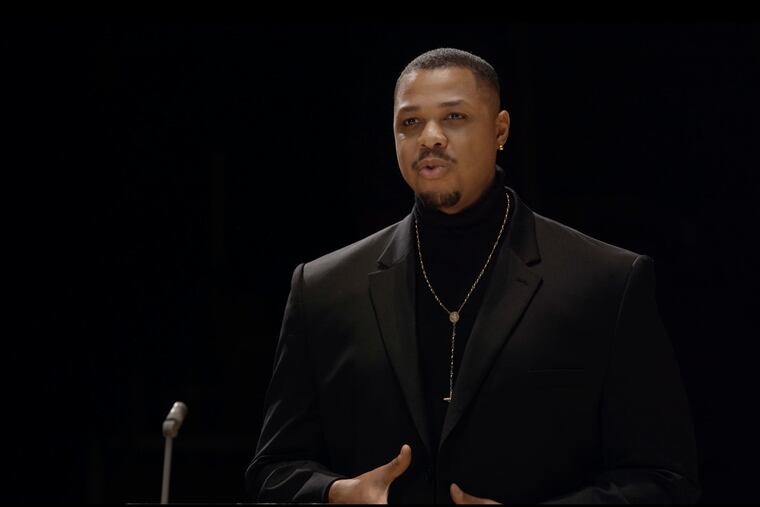With debut of ‘Sermon’ cycle, Davóne Tines holds a mirror to America on race with the Philadelphia Orchestra
One of the works in the triptych sung and co-written by Tines is dedicated to the memory of Breonna Taylor.

At its earth-shaking best, a meaningful encounter with art leaves you with the sensation that it’s saying something you’ve been feeling but didn’t quite know how to say.
With the creation of Sermon, Davóne Tines speaks for many. Sermon is actually not one piece but three, and the grouping, featured on the Philadelphia Orchestra’s Digital Stage series this week, adds up to something that comes right on time.
“I wanted to share with an audience what it might mean to be a marginalized identity, wanting to be able to move in a way, or exist in a way, in spite of marginalization,” says Tines in comments at the top of the production.
Each of these pieces has been performed before, but Sermon, packaged this way, is receiving its premiere with this online release, and it’s helpful to think of it a short song cycle. As Schubert used the reflection of one’s self in a brook to examine the big questions of existence and reality, so does Tines in this assemblage of works that, collectively, hold up a mirror to where America is on race.
“Hopefully with this program,” Tines continues, “an audience can see a person’s struggle for acceptance and humanity, and start to understand or at least interrogate for themselves their own hand in that…”
The three pieces — interspersed with spoken texts by James Baldwin, Langston Hughes, and Maya Angelou — add up to 20 minutes, including Tines’ beautiful pre-curtain commentary, which is integral to the experience. The sound-world of John Adams opens, with “Shake the Heavens” from El Niño (A Nativity Oratorio) in an arrangement by Preben Antonsen, Christian Reif, and Chad Canon. Adams’ signature momentum sets the mood of urgency.
“Where there is darkness, we’ll bring light,” sings Tines in the second piece, Vigil, dedicated to the memory of Breonna Taylor. Written by Igee Dieudonné and Tines himself in an arrangement by Matthew Aucoin, the piece floats like a lullaby that sends the singer lovingly into the higher part of his range. Here and elsewhere, Tines has a sound of impressive changeability.
The last of the trio has its origins in Philadelphia of several decades ago. X: The Life and Times of Malcolm X by composer Anthony Davis and librettist Thulani Davis, was developed and produced by the now-defunct American Music Theater Festival in 1985 before going on to New York City Opera the following year. The aria “You Want the Truth, But You Don’t Want to Know” ends the opera’s first act, and excerpted here by this orchestra led by Yannick Nézet-Séguin, it comes off as both incredibly mighty and nuanced.
Clarinetist Ricardo Morales steps out in a lonely solo that becomes a duet between him and an eerily bowed vibraphone played by Angela Zator Nelson. The piano, played by Davyd Booth, nudges the movement to action and into a world of menacing dissonance. The civil rights leader is being interrogated by the police.
“I would not tell you what I know,” sings Tines. “You wouldn’t hear my truth. You want the story but you don’t want to know. My truth is you’ve been on me a very long time. Longer than I can say. As long as I’ve been living you’ve had your foot on me. Always pressing.”
The forceful, controlled sound of Tines’ voice and daggers of orchestral brass magnify the text. A repeated, hasty string figure tells you what it feels like to be making your way while constantly looking over your shoulder.
“My truth told me stayin’ alive is all I got,” sings the title character.
It’s hard to know what other piece might provide a counterweight or echo to Sermon. But Mozart in a minor key did just fine — it will be the Symphony No. 40 when Sermon is repeated live next season, and the Symphony No. 25 online now.
Nézet-Séguin’s vision of this Mozart was appropriately lithe and angry, but curious in other ways. The earth-bound approach that oboist Philippe Tondre took to his repeated whole-note solos was enervating. Note by note, rather than connected and singing, his playing was mirrored by the conductor’s reduction of volume and energy in those sections. Important material by the violins was overpowered by winds in parts of the second movement.
An early-music-group concept of this piece, perhaps. Maybe it is more historically authentic, or beneficial to the musicians’ growth mindset. But is this really the ensemble sound that makes the Philadelphia Orchestra special?
The Philadelphia Orchestra’s Digital Stage program of Sermon and Mozart’s Symphony No. 25 streams May 6 at 8 p.m. through May 13 at 11 p.m. Tickets are $15 or $17. philorch.org.